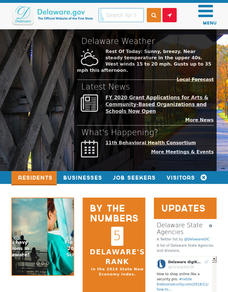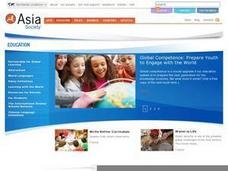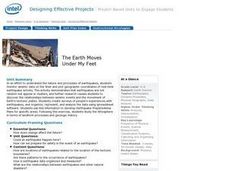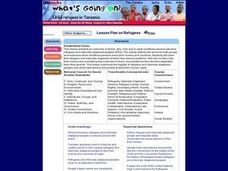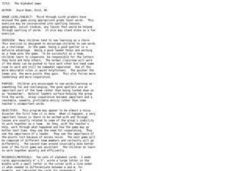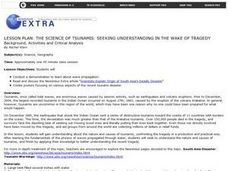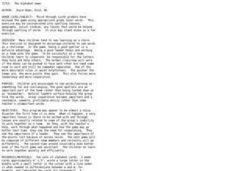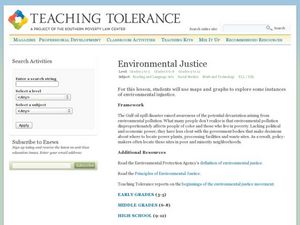Curated OER
Water-Is There Going to be Enough?
High schoolers research the availability, usage and demand for water in the local area historically and use projections of the availability, usage and demand for water up to the year 2050. They gather data and present the information in...
Curated OER
Shall We Go Dutch?
Young scholars examine the language and cultural differences that were encountered by the Indians and the Dutch leading to disaster for the first European settlement in Delaware.
Curated OER
How Did This Happen?
Pupils use websites and discussion to investigate the 2004 Asian Tsunami. Students identify the Indian Ocean coastline's physical, political and human geography features and consider how they affected loss of life and property in those...
Curated OER
Metropolitan Areas in the USA
Fifth graders explore why people live in certain regions of the United States. They investigate information on specific metropolitan areas such as temperature, population, natural resources, precipitation and landforms. In groups, 5th...
Curated OER
The Great Depression and Everyday Life
Examine everyday life during the Great Depression, as well as the effects if the Depression on American population, society, and economy. Learners write who, what, where, when, and why summaries of a person who relocated to California...
Global Oneness Project
After the Quake: Preserving the Artifacts of Kathmandu
On April 28, 2015, a 7.8 earthquake ruptured the Kathmandu Valley in Nepal. Seven UNESCO World Heritage sites are located in this valley. The efforts of experts and archeologists to restore three of them—Kathmandu Durbar Square, Patan...
Curated OER
Hunters and Gatherers
Sixth graders participate in mapping and other activities to understand why ancient civilizations developed as they did. In this ancient civilization lesson, 6th graders recognize that there were three important climate zones and...
Curated OER
The Earth Moves Under My Feet
Students study earthquakes, monitor seismic activity using the Web, and plot real-time activity. They examine movement of the Earth's tectonic plates. They create an earthquake preparedness project.
Curated OER
Too Hot to Handle
Students read an online article and research the ten most active volcanoes in the world. They devise an independent public service announcement for evacuating people living near a volcano.
Facing History and Ourselves
Who Are We?
Sixth graders explore the diversity of communities. In this community-building lesson, 6th graders compose biopoems and create a classroom exhibit entitled "Who am I? Who are We?"
Curated OER
Radio Program Disc 1, Track 6
Students place the Ohio river in its historical and geographical context. They listen to the radio stories, and are asked what postive and negative influences does the Ohio River have on nearby communities>
Curated OER
Migration - An African-American Adventure During WWI
Sixth graders explore the push/pull factors that influenced the South to North migration. In this African-American migration lesson, 6th graders read an article and answer comprehension questions. Students write a letter to the government.
Curated OER
Lesson Plan on Refugees
Pupils explore the issue of "human rights" and discuss world events/situations in which human rights are in question. They determine their own needs and wants and simulate the experience of being a refugee having to leave their home. ...
Curated OER
The Gulf Coast Region: Georgraphy, Demographics and the Effects of Hurricane Katrina
Students research Hurricane Katrina and create a Cause and Effect graphic organizer or a Chain of Events graphic organizer.
Curated OER
"I've Been Working on the Railroad" - Federal Land Grants and the Construction of the Illinois Central Railroad in Mid-nineteenth Century Illinois
Eleventh graders, in groups, design a self-sufficient community. Groups present the communities they've designed. They compare and contrast the communities presented. They research the theories of Johann Heinrich von Thunen online and...
Curated OER
Populations in the Path of Natural Hazards
Learners read "Geographical Mobility: 1995-2000." They examine the maps in the handouts and compare them with maps from an atlas. In the second part of this instructional activity, students read "In Harm's Way." They receive three more...
Curated OER
Canada's Arctic Barometer
Students research arctic climates. In this Web-quest investigation, students will identify Arctic climate changes, explain the effects of these changes, relate the changes to other regions, and write their findings in a letter format.
Curated OER
The Alphabet Game
Students participate in a game that promotes group unity while spelling words with letter cards. In this teamwork lesson, students have to work together to win the game, but may find it hard to do so without making a lot of noise. ...
Curated OER
The Water Dilemma
Students read about and discuss the importance of easily available, clean drinking water. They participate in a role play scenario in which only one drinking fountain in the school has potable water.
Curated OER
Plate Tectonic - Volcanoes (1)
Students learn the different shapes of Volcanoes and discuss why volcanoes only have a few shapes.
Curated OER
The Science of Tsunamis: Seeking Understanding in the Wake of Tragedy
Learners use Internet research, articles, discussion and models to explore the dynamics of a tsunami. They focus on the 2004 Asian Tsunami and create posters illustrating their understanding of this phenomenon.
Curated OER
Cranes, Crosswalks, and Big Gulps
Students watch a video and answer questions based on wildlife jobs. In this wildlife lesson plan, students learn that biologists don't just play with animals but that there is a lot of study involved.
Curated OER
The Alphabet Game
Students spell words using cards with each letter of the alphabet on them. In this alphabet lesson plan, students word in 2 teams and get points for the first team to spell the word correctly.
Curated OER
Environmental Justice
Students explore the concept of environmental stewardship. In this Gulf Oil Spill lesson, students discuss how environmental pollution affects those how live in poverty at a higher rate than those with more affluence. Students read...



